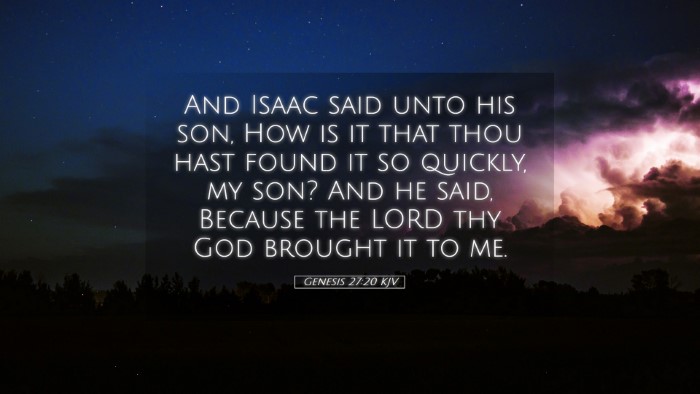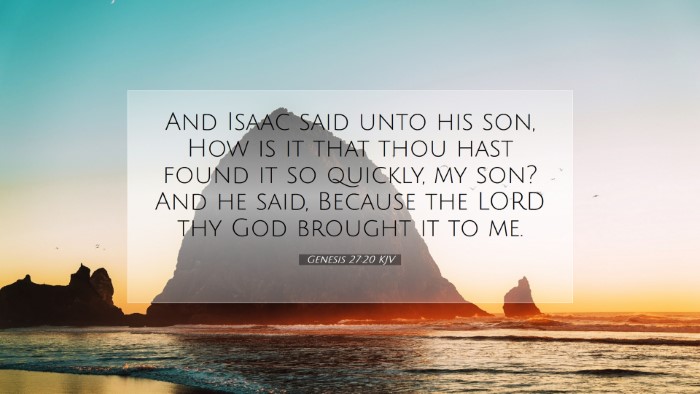Commentary on Genesis 27:20
Verse Context: Genesis 27:20 states, “And Isaac said unto his son, How is it that thou hast found it so quickly, my son? And he said, Because the LORD thy God brought it to me.” This moment occurs during a pivotal event in the life of Isaac and his sons, Jacob and Esau, where deception and divine providence converge.
Introduction
This verse reflects the interplay of human action and divine sovereignty. It encapsulates the tension between Isaac's skepticism and Jacob's deceit, with the overarching theme of God's hand in the unfolding of events. Public domain commentators provide profound insights into this complex dynamic.
Insights from Matthew Henry
Human Responsibility and Divine Providence: Matthew Henry emphasizes the providential hand of God in Jacob’s swiftness. Isaac's question reveals his suspicion, indicating the unbelievable speed of the hunt. Henry notes that the apparent “luck” that Jacob experiences is not mere chance but God's guidance. The phrase "the LORD thy God brought it to me" suggests Jacob's understanding of God’s role in his life and the outcomes, which is significant given the context of familial deceit.
The Nature of Deception
Henry illuminates Jacob's use of deception, recognizing that while Jacob's actions are not commendable, they align with God's ultimate plan for him as the chosen heir. This opens up the dialogue on moral ethics in Scripture and God’s capabilities to work through imperfect vessels.
Insights from Albert Barnes
The Role of Divine Favor: Albert Barnes focuses on the theological implications of Jacob’s statement. By attributing his success to “the LORD thy God,” Jacob poses a curious blend of truth and falsehood. Barnes notes this as a reflection not only of Jacob’s cunning but also as an acknowledgment of God's omnipresence in human endeavors.
The Contrast Between Isaac and Jacob
Barnes emphasizes Isaac's spiritual blindness, as he does not perceive the divine orchestration at work. The contrast between the father’s reliance on his senses and the son’s reliance on divine intervention sparks a rich theological discussion about faith, perception, and understanding God’s will amidst confusion.
Insights from Adam Clarke
Theological Significance of the Statement: Adam Clarke elaborates on the phrase "the LORD thy God brought it to me." He points out that Jacob’s words open up a theological discourse about the nature of divine guidance. Clarke proposes that even in Jacob's deceit, there exists a profound disclosure of God's intent. Despite the sinfulness of Jacob's actions, God's plan for the lineage of Israel is not thwarted.
The Concept of Blessings and Their Transmission
Clarke posits that the blessings of God are transmitted through means that may not always align with human morality. Here, the concept of being chosen affects not only the individuals involved but also the generations that follow. The implicit question raised is whether the ends justify the means in God’s plan, challenging readers to reflect on their understanding of divine sovereignty versus human agency.
The Overall Message of Genesis 27:20
This verse speaks volumes about the complexity of human nature and God's overarching grace. The commentators collectively portray the tension between human mistakes and divine purposes, prompting scholars and pastors to ponder deeper spiritual truths.
Practical Applications for Pastors and Theologians
- The Necessity of Discernment: Pastors can draw from this narrative the need for discernment when faced with situations involving deception or moral ambiguity.
- Understanding God’s Sovereignty: Theologians are reminded to teach about God's sovereignty, even in human failure, encouraging believers that their shortcomings do not hinder God’s sovereign will.
- Encouragement in Trials: This passage can serve as a source of encouragement for believers, affirming that God can bring about His purposes, even through flawed human actions.
The Call for Integrity
The narrative ultimately beckons individuals to a life of integrity, highlighting that, while God works through our imperfections, He still desires truthfulness and obedience in our dealings with one another.
Conclusion
Genesis 27:20 stands as a testament to the intricate tapestry of God’s providence amid human frailty. It invokes reflections on faith, morality, and the divine plan, forging a pathway for theological reflection and practical application in the lives of believers. The insights from Matthew Henry, Albert Barnes, and Adam Clarke enrich our understanding of this critical moment in biblical history, providing valuable lessons for modern-day faith communities.


